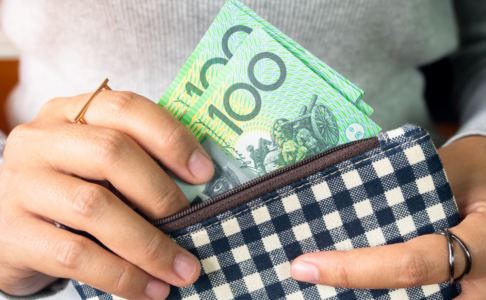Three easy steps that could save you thousands every year!
- Replies 3
We all know that saving money can be hard, especially if your expenses seem to always add up to more than your income. But what if we told you that there was a way you could easily save a bit of extra money each month?
Enter: financial fasting.
What is financial fasting? According to Frances Cook, a personal finance author, it's defined as living off the 'bare minimum' for one week out of every month to save money.
This means eating cheaply, avoiding social plans, and generally just not spending any extra money during that week. Sounds pretty simple, right? That's because it is! And the best part is: it only requires three steps…

Step 1: Figure out how much the bare minimum costs for one week. This includes things like a very basic grocery shop, bills, rent or mortgage repayments, and any other necessary expenses. Write it all down, so you have a clear idea of exactly how much you need to spend.
Step 2: Block out one week of every month for your financial fast. During this time, only spend the bare minimum amount that you calculated in Step 1 – nothing more! Try to keep social plans to a minimum as well so you can save even more money.
Step 3: Once the week is over, put all the money you saved into an online savings account (or a locked piggy bank) and don't touch it. Then go back to your normal life for the rest of the month, knowing you've done something good for yourself, financially speaking.
Some people prefer implementing their financial fasts during times when they know they won't have much extra income – like the week before they get paid or right after they get paid – but really, any time works as long as you stick with it!
And who knows? After doing this for a while, maybe living frugally will become second nature…

And while we're talking about budgeting and money-saving advice, here are some additional suggestions from Frances on how to handle your finances more effectively.
Keep a money diary
Keep track of all of your expenditures, and categorise them according to whether or not they were necessities (such as food, rent, petrol, etc.) or if they brought you joy. Trying to stick to a budget by eliminating all of the things that make you happy is a recipe for disaster!
Cut out what you don't need
Eliminating temptations that can be quite expensive, such as online shopping, certain premium foods or luxury items, is another way to free yourself from things you don't need. But don't be too hard on yourself; you can still enjoy them occasionally.

Consider smarter spending
Saving money does not always mean refraining from spending. Sometimes, you also have to be practical and smart when it comes to purchases. For example: if you want to catch up with a friend at a cafe, skip brunch and only go for coffee instead.
Don't bother wasting money trying to impress people
This one should go without saying. No matter what you say, people will always think what they want to think of you - and there's no changing that! Sometimes, it's easy to believe that other people are always watching what we do, but they really aren't.
If you're going to spend money, put it towards something you actually like (and can afford, of course). Don't bother with the rest; just shrug them off.
So, what are your thoughts, members? Have you ever heard of the concept of financial fasting before? If so, did you happen to give it a try? How did it go?
If you have more money-saving tips, let us know in the comments below! We'd love to hear what you think about this topic!
Enter: financial fasting.
What is financial fasting? According to Frances Cook, a personal finance author, it's defined as living off the 'bare minimum' for one week out of every month to save money.
This means eating cheaply, avoiding social plans, and generally just not spending any extra money during that week. Sounds pretty simple, right? That's because it is! And the best part is: it only requires three steps…

There is a way to help people learn how to budget and not waste their money on things they don't need. Credit: Freepik. (Stock photo)
Step 1: Figure out how much the bare minimum costs for one week. This includes things like a very basic grocery shop, bills, rent or mortgage repayments, and any other necessary expenses. Write it all down, so you have a clear idea of exactly how much you need to spend.
Step 2: Block out one week of every month for your financial fast. During this time, only spend the bare minimum amount that you calculated in Step 1 – nothing more! Try to keep social plans to a minimum as well so you can save even more money.
Step 3: Once the week is over, put all the money you saved into an online savings account (or a locked piggy bank) and don't touch it. Then go back to your normal life for the rest of the month, knowing you've done something good for yourself, financially speaking.
Some people prefer implementing their financial fasts during times when they know they won't have much extra income – like the week before they get paid or right after they get paid – but really, any time works as long as you stick with it!
And who knows? After doing this for a while, maybe living frugally will become second nature…
Key Takeaways
- A personal finance author has shared a three-step tactic to help you save money each month known as 'financial fasting'.
- The method involves living frugally for one week per month and aims to help people learn how to budget and avoid blowing their income on unnecessary spending.
- The key benefits of financial fasting include learning how to budget better and saving money each month.
Keep a money diary
Keep track of all of your expenditures, and categorise them according to whether or not they were necessities (such as food, rent, petrol, etc.) or if they brought you joy. Trying to stick to a budget by eliminating all of the things that make you happy is a recipe for disaster!
Cut out what you don't need
Eliminating temptations that can be quite expensive, such as online shopping, certain premium foods or luxury items, is another way to free yourself from things you don't need. But don't be too hard on yourself; you can still enjoy them occasionally.

Spending money on things that matter to you is just as important as saving for the future. Credit: iStock. (Stock photo)
Consider smarter spending
Saving money does not always mean refraining from spending. Sometimes, you also have to be practical and smart when it comes to purchases. For example: if you want to catch up with a friend at a cafe, skip brunch and only go for coffee instead.
Don't bother wasting money trying to impress people
This one should go without saying. No matter what you say, people will always think what they want to think of you - and there's no changing that! Sometimes, it's easy to believe that other people are always watching what we do, but they really aren't.
If you're going to spend money, put it towards something you actually like (and can afford, of course). Don't bother with the rest; just shrug them off.
So, what are your thoughts, members? Have you ever heard of the concept of financial fasting before? If so, did you happen to give it a try? How did it go?
If you have more money-saving tips, let us know in the comments below! We'd love to hear what you think about this topic!







